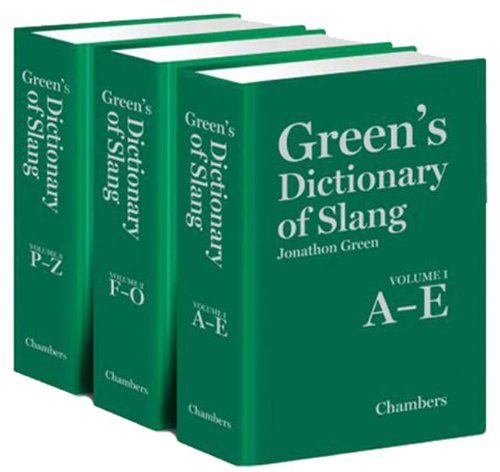
Holed up in his London flat, Jonathon Green has been toiling among his antique books for years, trying to bring a great work to the masses. That work includes 1,740 terms for sexual intercourse (boozle, bop, bonk, bake the biscuits), 4,589 related to getting drunk (atomized, above par, unable to hit the ground with one’s hat) and 521 that allude to murder (do in, eighty-six, O.J.). And now, after years of struggle, that work has finally gone live on the web.
“The potential of an online dictionary has to go beyond that of even the greatest print lexicons,” says the 68-year-old dictionary maker, who has been studying, collecting and defining slang for decades. Green published one of those great lexicons in 2011, when Green’s Dictionary of Slang became the most comprehensive one to ever be parked on a bookshelf. Achievement though it was, however, he realized that his work had limited usefulness in the unsearchable, expensive, fixed form of a hulking three-volume set.
Green suffered through several setbacks (flaky developers, ghosting publishers, frustrations with funding) before finally teaming up with programmer David Kendal and putting what has grown to 132,000 terms online this month. Last fall, toward the end of that struggle, he sounded exhausted but optimistic. “I don’t want to be an old man sitting in a small room finding another word for masturbation. There’s more to life,” he says. “But this is what we do. And what I’ve created, I dare say, is an unrivaled database.”
Imagine if someone took the crowd-sourced Urban Dictionary—where definitions of slang words are as likely to be up-voted for being funny as having any relation to a word’s actual meaning—and researched every term, boiling the most vulgar or silly slang down to a reliable definition, or perhaps several, and figuring out just how far back in time people had been using that word.
Take da bomb. On Urban Dictionary, the top definition explains that the phrase’s meaning is “A really stupid way of saying something’s awesome…I mean how old is it now??” In Green’s database, you not only get a concise definition (“the best”) but learn that the phrase was popularized by black Americans, associated with students, and that it goes back to at least 1960. You can peruse related terms nearby, like cost a bomb (be expensive) and on the bomb (in fine condition).
Green analyzes every word with the precision and seriousness of a doctor doing an autopsy, giving one of the most vibrant branches of the English language the respect of a scholar—even if the subject matter isn’t always fit for gentle readers.
The basic functions of the site are available for free: look up a word, get the definition and the etymology. Parents everywhere can now figure out what in the Sam Hill their kids are talking about when they refer to someone or something as ratchet or lit. (Nota bene: Just because you understand it doesn’t mean you should use it. Take it from someone who recently attempted to call something “slay” among her teenage cousins.)
But to really go down the rabbit hole, one has to pay about $50 per year, $12.50 for students. For that fee, you can search by meaning, finding not just the definition of ratchet but every slang word that has ever described extreme, out of control behavior. You could look up all the slang that, to the best of Green’s knowledge, cropped up in the year of your birth—it appears I came into the world around the same time that brain fart did—or find every word Charles Dickens used for thief. His citations, hundreds of thousands of examples of how these words have been used throughout time, are also only available to subscribers.
Since his reference work was published in 2011, Green says that he’s augmented about 30% of it, and the improvements will keep coming. It’s common, for example, to find evidence that a slang word was used years earlier than anyone had discovered before. In the past several years, with new databases of old books and newspapers constantly coming online, Green has done this literally 10,000 times. He plans to keep seeking the “holy grail” of first uses and adding new words, with the benefit of now knowing what people are trying to search for on the site. Updates are planned to come every three months.
Green says that in the few hours the site has been live, the usual suspects have emerged: linguists, fellow lexicographers, language lovers. It’s likely the material will become a treasured resource of novelists or screenwriters penning the next Mad Men or Downton Abbey. Historians. Journalists. Students. Some of the millions of people learning English as a second language. Anyone who likes their definitions fact checked.
“The search engines haven’t picked us up yet, so the wider world has yet to come on board,” Green says. “I have always known that whatever else the internet offers … it is the perfect home for reference.” As American students apparently said in the early ’80s to express enthusiastic agreement: Egg. A. Muffin.
More Must-Reads from TIME
- Cybersecurity Experts Are Sounding the Alarm on DOGE
- Meet the 2025 Women of the Year
- The Harsh Truth About Disability Inclusion
- Why Do More Young Adults Have Cancer?
- Colman Domingo Leads With Radical Love
- How to Get Better at Doing Things Alone
- Michelle Zauner Stares Down the Darkness
Contact us at letters@time.com